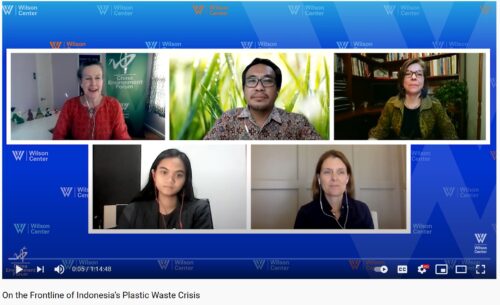Three Lessons from USAID’s Ocean Plastics Pollution Work in Indonesia

Indonesia is on the forefront of the global ocean plastic pollution challenge. The country produces 6.8 million tons of plastic waste annually, largely driven by rising demand for single-use plastics such as straws, bottles, sachets, and food containers that meet the needs of a rapidly urbanizing population. To date, only about 10 percent of Indonesia’s plastic waste is recycled, contributing to the country’s status as one of the largest producers of ocean plastics globally.
At USAID, we know that major investments are needed to establish the waste management and infrastructure systems necessary to combat ocean plastic pollution. However, most cities in Indonesia and other Southeast Asian countries are not investment-ready due to low tariffs, weak collection systems that are highly dependent on informal workers, and the lack of long-term waste management plans and concrete proposals for investor funding. At a event hosted by the Wilson Center, “On the Frontline of Indonesia’s Plastic Waste Crisis,” I sat down with our partners and grantees to discuss how USAID is working to develop effective, scalable approaches that not only mitigate and prevent ocean plastics but also mobilize new capital and improve the enabling environment for investors. (Watch the event recording here.) Featuring presentations from Divers Clean Action, Bintari Foundation, and Circulate Capital, the discussion elevated three key lessons to inform the future of ocean plastics pollution work in Indonesia:
A rich network of actors is already implementing practical and effective solutions to ocean plastic pollution in Indonesia. USAID’s Municipal Waste Recycling Program provided $5.5 million worth of grants to locally led initiatives in four countries: Indonesia, the Philippines, Sri Lanka, and Vietnam. MWRP grantees in Indonesia were already working across the country, from small islands to large cities, to address ocean plastics with innovative tools and approaches. USAID did not need to develop an entirely new approach to make an impact; rather, our support for these ongoing initiatives and innovations unlocked constraints, allowing them to expand and scale.
Addressing the waste collection service gap is critical. According to UN Habitat, 2 billion people around the world don’t have waste collection services. In the city of Semarang, Indonesia alone, 30 percent of residents do not benefit from these services. Without collection services, households often dump their waste or burn it, two options that are harmful to the environment. Through Clean Cities, Blue Ocean, our new global flagship program against ocean plastic pollution, USAID will collaborate with the Government of Indonesia to provide support to three cities that can become models for improved solid waste management, incorporating the central role that informal waste collectors play in Indonesia’s waste collection, particularly for recyclables.
Stopping ocean plastic pollution begins at the source: on land. The binding thread across all of USAID’s ocean plastics work has always been the same: interrupting the land-based sources of ocean plastic pollution. Our work thus far has taught us that doing so effectively requires massive social and behavior change, such as waste segregation and consumer-driven demand for less plastic packaging. USAID grantees were very effective in educating their communities about the impact of mismanaged waste and successfully motivated individuals to take steps to improve the quality of their larger environment.
More insights on USAID’s ocean plastics work are included in the Wilson Center’s new publication Turning the Tide: How Can Indonesia Close the Loop on Plastic Waste?
Around the world, USAID works to protect our oceans – and billions of people who depend on them for food and livelihoods – by limiting climate impacts and addressing other critical threats, including ocean plastic pollution.

